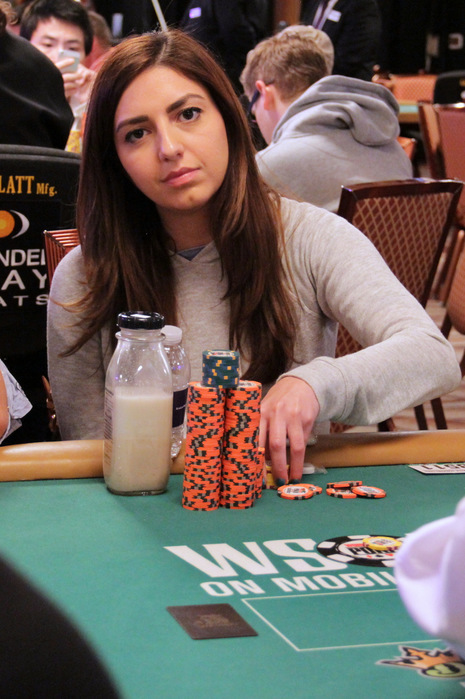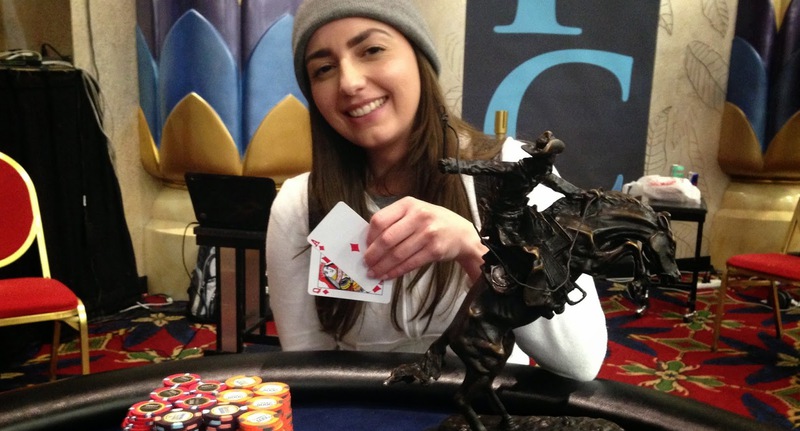






Kelly Minkin Says It's "Human Nature" To Highlight Women In PokerMinkin Talks About Being Successful In The Male Dominated Poker World |
|
|
There just aren’t enough hours in the day for Kelly Minkin. The Phoenix, Arizona native spent her childhood bouncing from one activity to the next, whether it was softball, piano lessons, painting, volleyball or even water skiing. That go-hard mentality followed her into college where she earned degrees in molecular and cellular biology.
Intending on going to medical school to become a surgeon, Minkin instead took the LSAT on a whim and scored well enough to get into law school despite never studying or preparing for the test. After passing the bar exam, she began working at a Phoenix law firm as a medical malpractice defense attorney.
But despite the demanding schedule her profession requires, Minkin has never strayed away from her other passion of poker. She burst onto the scene in August of 2013, finishing runner-up in the $1,000 buy-in Arizona State Poker Championship for $151,983. In January of this year, she won a $500 buy-in preliminary event at the L.A. Poker Classic for $54,630.
Then in February, she earned the largest score of her still young career when she took third at the $3,500 buy-in WPT Lucky Hearts Poker Open Championship for $262,912. This summer, she added another $211,821 by becoming the last women standing in the World Series of Poker main event, eventually busting in 29th place.

Julio Rodriguez: Last month, some in the poker world began a debate about the attention and sponsorship offers female poker players receive and whether or not it is justified. As someone who just received a lot of publicity for a deep run in the WSOP main event, where do you stand on this issue?
Kelly Minkin: Well, it’s a convoluted issue that has stemmed in many different directions. That being said, I think that what a marketing company decides to spend their time and money on is a completely separate issue that doesn’t have anything to do with the skill of any particular player. I had a small debate of my own on Twitter about a female player who had a deal. There were some outspoken players who felt that she didn’t have enough results and therefore wasn’t a good poker player and wasn’t deserving of the deal. Well, what does that actually have to do with representing a brand? If the company feels she is marketable in any sense, then I don’t see what results or skill has to do with it.
JR: The WSOP coverage on ESPN has just started, but as the last woman standing you are undoubtedly going to receive a lot of screen time, perhaps even more than some of the players who last longer. Does it bother you to be singled out like that?
KM: I’m not offended by the attention I get just because I’m a woman and I play poker. Anytime there’s something that stands out, whether its your personality, skill or even gender, they are going to highlight that. It’s human nature. If you open a bag of Skittles that is mostly orange, but discover a purple one and a green one, then you are going to be drawn to the purple one and the green one.
 There aren’t a lot of women in poker, so when they see a women who is successful, they are going to highlight that. That’s okay. Nobody criticizes ESPN or other media for focusing on [William Wachter] the man in his nineties who cashed in the main event. Nobody goes after the elderly and says they don’t deserve the attention. It’s just a matter of what stands out, and for some reason, some poker players don’t like it when women stand out.
There aren’t a lot of women in poker, so when they see a women who is successful, they are going to highlight that. That’s okay. Nobody criticizes ESPN or other media for focusing on [William Wachter] the man in his nineties who cashed in the main event. Nobody goes after the elderly and says they don’t deserve the attention. It’s just a matter of what stands out, and for some reason, some poker players don’t like it when women stand out.
JR: Ironically, you are now receiving attention that you don’t really want. You’ve described yourself in the past as an introvert who’d rather not be highlighted.
KM: It’s definitely a double edged sword. I don’t like the spotlight. I like being in the background. I’m a very private person so it can definitely feel uncomfortable. But at the same time, I don’t want to let that discomfort prevent me from enjoying the moment.
JR: What was your unique experience as a woman when you first got into poker?
KM: I grew up with two brothers and have really thick skin, so that definitely helped me when I first started playing poker. I think it helped me to not be personally affected when things were said or done at the poker table. I’ve had some instances where other players have been rude, said offensive things to me, or even made me feel threatened, but unfortunately that comes with the territory when you are trying to break into a male-dominated world like poker.
People make all sorts of assumptions. They think I’m at the table with my boyfriend and he’s teaching me how to play. Or they think I’m playing with my dad’s money. I try and keep a smile and be non combative, but there have been altercations in the past. Its unfortunate but as a female poker player, you often have to do what you can to limit the attention that is automatically going to be placed on you. You are already sitting at the table with a target on your back, so I try not to make it worse when I hear the comments or someone gets upset that I’m winning. At the end of the day, it doesn’t matter what people think as long as they are giving me their money.
JR: Has the rude comments or unwanted attention eased up at all since you’ve transitioned into a more recognizable face on the tournament circuit?
KM: One thing that I did notice about the poker world is that, as I improved as a player and got more respect from the other players for my poker skills, the negative aspects of the game started to go away. Over the last year or so, other players have been telling me that they respect my game as a poker player, not that they respect my game as a female poker player. I think as you move up in the poker world, you find that most people are nice and courteous. Maybe the miserable people tend to stay in the smaller games.
JR: Are you concerned at all about how you will be portrayed in the ESPN coverage of the WSOP? What are you hoping to see?

Other than that, I’m not concerned with what ESPN decides to show or not show. I stand by how I played in the main event, whether they show me making a mistake or playing a hand well. You can’t really explain how exhausting that experience is. It’s unlike anything I’ve ever done before, so I’m proud of the way I kept my composure and handled myself as the tournament went on. Even if they make me look terrible it will be fine because I know I played well and that’s all that matters.
Look for an in-depth profile on Minkin in an upcoming issue of Card Player Magazine.
